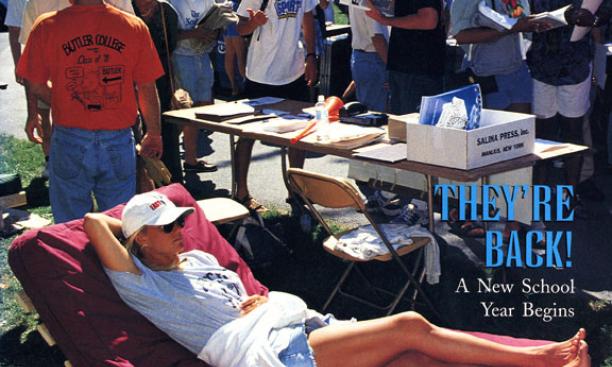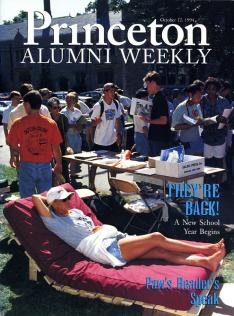
They're back: A new school year begins, 1994 Finding a place to rest amidst the hustle and bustle of student move-in day can be a challenge. Ashley Hall â95's peaceful repose in September 1994 caught the attention of PAW, which featured her on its Oct. 12, 1994, cover. (Hall, a caption explained, was working at the booth of the Student Futon Agency.) As the Class of 1998 arrived on campus, the top news was the proportion of freshman women -- 47.5 percent of the class, then a Princeton record. See story below. From PAW, Oct. 12, 1994 University greets Class of â98 In the 25th year of coeducation, a record number of first-year women Princeton began its 25th year as a coeducational institution last month by greeting a freshman class with the highest proportion of women ever. Some 47.5 percent of the Class of 1998, which numbers 1,158, is female; if prospective engineering students are removed from the count, women are a 51.2 percent majority. "Terrific. I think that's wonderful," said Becky Gitenstein â96, a Woodrow Wilson major from Washington, D.C., whose own class was 45.4 percent female when it matriculated two years ago. "In terms of diversity and balance, the numbers in the new class are much more representative of the United States and of what people will face after graduation. I think Princeton is getting closer to being truly coeducational." Minorities, too, are represented in increased numbers. Asian-Americans make up 11.9 percent of the new class, compared to 9.8 percent among last year's freshmen. Hispanics are 6 percent, up from 5.4 percent, and African-Americans are 6.8 percent, up from 6.6 percent. Six percent are international students, representing thirty-three foreign countries. A majority of the class -- 56.2 percent -- comes from public schools, and 43.7 percent are graduates of private or parochial schools. Sons and daughters of alumni make up 11.8 percent of the class, down slightly from 12 percent. As classes began on September 12th, total undergraduates numbered 4,533. The five most popular courses among freshmen are Physics 103 (general physics), with 319 enrolled, Literature 141 (modern European writers) with 303, general chemistry with 227, calculus with 193, and Economics 101 (the national economy) with 167. For the first time in recent years, New Jersey is not the state with the highest representation in the freshman class. The honor this year goes to New York, the home state of 168 new undergraduates. The Garden State is next with 149, and California third with 96. The Graduate School welcomed 467 new students, 35 percent of whom are foreign nationals, representing 44 countries. Women make up 38.7 percent of new graduate students. Among U.S. nationals, 5 percent are Asian-American, 3 percent African-American, and 1 percent Hispanic. By area of study, 103 new graduate students are in the natural sciences, 96 in the humanities, 89 in engineering, 81 in public and international affairs, 73 in the social sciences, and 25 in architecture. Total graduate enrollment is 1,843. More than half of all freshmen began their Princeton experience by taking part in off-campus programs. Rick Curtis â79, the director of Outdoor Action, said that a record 558 participated in sixty-three backpacking and canoeing trips over the Labor Day weekend: "That's 2,209 miles of hiking and paddling in six states, from Maryland to Vermont -- more than the length of the Appalachian Trail." Chris Drake, who heads Urban Action, reported that, in the program's eighth year, 85 freshmen signed up for volunteer efforts in Trenton and Philadelphia, where they helped in a soup kitchen, rebuilt housing, and worked with teenagers. The official start of the academic year began with Opening Exercises, held September 11th in the Chapel. Leading the procession was John Arucci, a teacher in the music department, who headed a trio drumming on African percussion instruments. The convocation also included more traditional choral anthems, a benediction written by the Harlem poet Langston Hughes, and a Hebrew blessing, "Y'varechecha Adnai" ("May the Lord bless you."). President Shapiro's address focused on reading and ideas. "Each time we begin an academic year," he said, "we begin anew a process of opening ourselves to new ideas, new challenges, and new possibilities for what we may think, what we may do, and what we may become." Books, he emphasized, are "a particularly important vehicle for such possibilities," and "analytical reading is the core of the learning process." That evening, freshmen gathered in Alexander Hall for the annual Honor Assembly. This year's guest speaker, Regis Pecos â77, the executive director of Indian Affairs for New Mexico, began his address in Keresan, the language of his Pueblo tribe. Shifting into English, he related Princeton's honor system to his own struggles to be true to his Native-American culture while contributing to the mainstream society.

